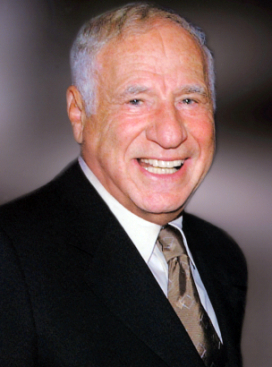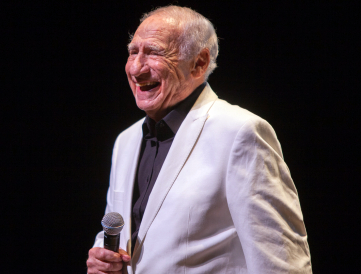America’s Comedy King
Still
Thrives At 90
OTHING
is sacred when Melvin James Kaminsky hits town. Kaminsky,
better known as director/producer/writer/actor/outrageous
comic Mel Brooks,
is showing up all over the country at screenings of his
groundbreaking off-the-wall 1974 film
Blazing Saddles,
which the late critic
Roger Ebert described as “a crazed, grab-bag of a movie
that does everything to keep us laughing except hit us over
the head with a rubber chicken.”
When the movie
ends and the lights come up — Mel is unleashed. He’s already
played the Kennedy Center, and recently showed up in
Philadelphia and Hartford.

Mel Brooks |
For more than 60
years he has plied his trade turning out sidesplitting
comedies that have skewered every cinematic genre and topic
known to man: Westerns (Blazing
Saddles), horror (Young
Frankenstein), sci-fi (Spaceballs),
Hitler (The Producers),
legends (Robin Hood
Men in Tights). Not to mention world history in
The History of the World Part 1 in which he plays five roles —
plus writing, producing and directing. Even
Alfred Hitchcock
got the Brooks treatment (in
High Anxiety.)
Along the way he’s
picked up a bagful of prizes: Oscars, Emmys Grammys. The
auteur director is known also for his five Grammy-winning
comedy albums stemming from
The 2,000 Year Old Man
which got its start in l961.
“Mel is involved
in controlled madness on his movies,” observes actress
Madeline Kahn, a
regular in many of his movies.
John Trembler,
producer of Brooks’s live performances, puts it this way:
“I’m totally in awe of him. He’s a unique force of nature
with the energy of a man half his age.”
Trembler notes
that Brooks’s passion never wanes. “He likes to come to the
theater at the beginning of the movie and sit in the wings
and listen to the audience. Then he shakes his head in
disbelief because they are still laughing 40 years later.”
I talked by phone
with the peripatetic Brooks who amazingly turned 90 on June
28.
How does it feel to
get back in the saddle when you’re pushing 90?
I never got out of the
saddle. I’ve been busy. I’m going back to my first
love, which is live theater. I started in the Borscht Belt
when we did three or four items a week in a musical revue, a
play, then amateur night. I was always busy onstage doing
something. Writing sketches beginning on Broadway in l952 in
a show called New Faces
with Eartha Kitt,
Paul Lynde and
Carol Lawrence. I still get goosebumps when a
Broadway orchestra strikes up.
What can we expect
when you go on stage?
I kind of talk a lot. It’s a
wandering trip through my life. The story of a poor kid from
Brooklyn. How I came to be. Stories of being in the Army (as
a combat engineer in World War II Germany), hearing a German
platoon singing across the river—and me singing back Toot Toot
Tootsie Goodbye (the Al Jolson song) to straighten them out. Stories
about the TV show Get
Smart, and with
the incredible Sid
Caesar and Imogene Coca, writing
Your Show of Shows
with Carl Reiner
and Neil Simon.
I understand making
Blazing Saddles wasn’t a cakewalk for you?
I quit the film once. Richard Pryor was
to be Black Bart the sheriff, but the studio said no.
Richard was having drug problems and wasn’t a proven star.
But he persuaded me to do it without him. He said he
wouldn’t get paid if the movie was cancelled. He helped me
find Cleavon Little
and said, “I’ll be good and get the laughs—but there’s no
way I would scare those rednecks shitless like Cleavon
could.”
Tell us about that
legendary campfire scene?
Blazing Saddles
allowed me to be the lovely Rabelaisian vulgarian that I am.
I mean those cowboys farting around the campfire allowed me
for the first time to really exercise my scatological
muscles. So we had a bunch of guys eating a lot of beans and
delivering a mighty symphony orchestra—music in the wind!
What about your
Indian Chief speaking Yiddish. Surely another first for a
Western?
I
didn’t want to do the clichéd Indian sounds —Hi Yoyo— and
that sort of stuff. I was thinking that no one knew Yiddish
so why not use it. My grandmother used to speak Yiddish to
me when I was a kid in Brooklyn. At early screenings I saw
that when there are Jews in the balcony there’s thunderous
laughter when the Chief speaks.

Mel Brooks |
Did you mother Kate
speak Yiddish.
No. She came from Kiev but spoke
with an Irish accent.
Irish?
No. She went to grammar
school in New York in l915—and all the teachers and
politicians spoke with an Irish accent. It stuck.
Talk about your
smash hit Broadway musical The Producers,
which came 34 years after the movie opened. Like
Chaplin, you lacerated and lampooned Hitler.
It’s part of my
heritage. No Chaplin, no Mel Brooks. You learn from the
greats of the past. In Great
Dictator Chaplin plays this little Jewish barber who is
mistaken for the Fuhrer. He is beautiful, doing that ballet
with the balloon as the globe of the world.
So you borrowed a
leaf from the Chaplin playbook?
Yes. When Producers first
came out the critics said it was totally tasteless.
Peter Sellers, the genius English actor, loved it and out of
his own pocket paid for ads in the Hollywood trade papers
saying it was the funniest movie he’d ever seen. And the
film was saved. Before that you couldn’t get arrested.
What drives you at
90?
I’m
always doing something. I just played the Kennedy Center
with this show and now I’m doing other venues. I’m
re-energized…up and flying…around the stage. It’s very
important. That’s my fuel, the basis of my energy, the
laughter that comes flying back. Sometimes the energy
is so big that if I wore a hat it would blow away.